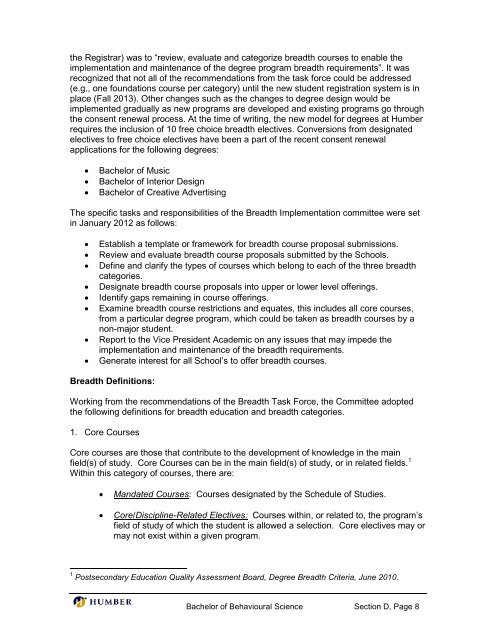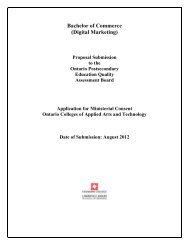Bachelor of Behavioural Science - Postsecondary Education Quality ...
Bachelor of Behavioural Science - Postsecondary Education Quality ...
Bachelor of Behavioural Science - Postsecondary Education Quality ...
You also want an ePaper? Increase the reach of your titles
YUMPU automatically turns print PDFs into web optimized ePapers that Google loves.
the Registrar) was to ―review, evaluate and categorize breadth courses to enable the<br />
implementation and maintenance <strong>of</strong> the degree program breadth requirements‖. It was<br />
recognized that not all <strong>of</strong> the recommendations from the task force could be addressed<br />
(e.g., one foundations course per category) until the new student registration system is in<br />
place (Fall 2013). Other changes such as the changes to degree design would be<br />
implemented gradually as new programs are developed and existing programs go through<br />
the consent renewal process. At the time <strong>of</strong> writing, the new model for degrees at Humber<br />
requires the inclusion <strong>of</strong> 10 free choice breadth electives. Conversions from designated<br />
electives to free choice electives have been a part <strong>of</strong> the recent consent renewal<br />
applications for the following degrees:<br />
<br />
<br />
<br />
<strong>Bachelor</strong> <strong>of</strong> Music<br />
<strong>Bachelor</strong> <strong>of</strong> Interior Design<br />
<strong>Bachelor</strong> <strong>of</strong> Creative Advertising<br />
The specific tasks and responsibilities <strong>of</strong> the Breadth Implementation committee were set<br />
in January 2012 as follows:<br />
<br />
<br />
<br />
<br />
<br />
<br />
<br />
<br />
Establish a template or framework for breadth course proposal submissions.<br />
Review and evaluate breadth course proposals submitted by the Schools.<br />
Define and clarify the types <strong>of</strong> courses which belong to each <strong>of</strong> the three breadth<br />
categories.<br />
Designate breadth course proposals into upper or lower level <strong>of</strong>ferings.<br />
Identify gaps remaining in course <strong>of</strong>ferings.<br />
Examine breadth course restrictions and equates, this includes all core courses,<br />
from a particular degree program, which could be taken as breadth courses by a<br />
non-major student.<br />
Report to the Vice President Academic on any issues that may impede the<br />
implementation and maintenance <strong>of</strong> the breadth requirements.<br />
Generate interest for all School‘s to <strong>of</strong>fer breadth courses.<br />
Breadth Definitions:<br />
Working from the recommendations <strong>of</strong> the Breadth Task Force, the Committee adopted<br />
the following definitions for breadth education and breadth categories.<br />
1. Core Courses<br />
Core courses are those that contribute to the development <strong>of</strong> knowledge in the main<br />
field(s) <strong>of</strong> study. Core Courses can be in the main field(s) <strong>of</strong> study, or in related fields. 1<br />
Within this category <strong>of</strong> courses, there are:<br />
<br />
<br />
Mandated Courses: Courses designated by the Schedule <strong>of</strong> Studies.<br />
Core/Discipline-Related Electives: Courses within, or related to, the program‘s<br />
field <strong>of</strong> study <strong>of</strong> which the student is allowed a selection. Core electives may or<br />
may not exist within a given program.<br />
1 <strong>Postsecondary</strong> <strong>Education</strong> <strong>Quality</strong> Assessment Board, Degree Breadth Criteria, June 2010.<br />
<strong>Bachelor</strong> <strong>of</strong> <strong>Behavioural</strong> <strong>Science</strong> Section D, Page 8
















